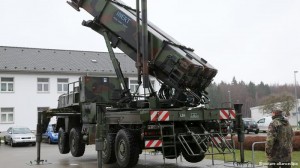 An Iranian official has warned Turkey against deploying missiles to its border with Syria, calling it a plot to create a “world war.” Within Syria, rebels claim to have fought back government forces in Daraya.
An Iranian official has warned Turkey against deploying missiles to its border with Syria, calling it a plot to create a “world war.” Within Syria, rebels claim to have fought back government forces in Daraya.
An Iranian military official has taken issue with the Patriot missiles NATO has approved upon Turkey’s request to bolster its border defenses against Syria. Germany, the Netherlands and the United States have agreed to provide the missile batteries, which would come under NATO command. However, both Russia and Iran, the most powerful allies of the Assad regime, are opposed to the move.
“The Patriot (missiles) are threatening,” General Hassan Firouzabadi said, according to the ISNA news agency. “Each one of them is a black dot on the map to create a world war. The Western countries seeking to deploy the missile batteries on the Turkey-Syria border are devising plans for a world war.”
Meanwhile, in Daraya, a stronghold of rebels from the Al-Nousra Front – blacklisted by the US as a “terrorist” organization – claim to have successfully repelled an attack by regime forces. The pro-government private broadcaster al-Dunia, however, reported that government troops were targeting “terrorists’ hideouts” and had killed dozens of insurgents. The rebels have recently clashed with troops in and around Damascus, such as in the poor suburb of Daraya, raising the possibility that Assad could lose his hold on the capital.
“So far nothing has changed on the ground in Daraya,” said Rami Abdel Rahman of the London-based Syrian Observatory for Human Rights. “No major advances were recorded by either of the warring sides, but fierce clashes are raging and heavy weapons are being used in the battles.”
‘Qualitative defections’
Ahmed Jibril, veteran leader of a Damascus-based Palestinian faction that backs Assad, has left the Yarmouk district of the capital after 12 days of clashes, Syrian rebels and Palestinian sources announced. The southern Damascus district has proved a pivotal point on the arc from the east to the southwest of the capital, where Assad’s forces have tried for weeks to push rebels back.
Damascushas experienced fierce fighting this month; rebels are believed to control several patches of territory near the airport, and the regime is pushing to seize back territory within 8 kilometers (5 miles) of the capital. Such violence in the heart of Syria has fueled speculation that President Bashar Assad could soon lose his grip on the country.
Across the border, public-sector workers opposed to Assad have formed a new opposition group. In Jordan, Syrian activists announced the Free National Coalition of State Institution Workers: former public sector employees led by past Prime Minister Riyadh Hijab. The group, which will act under the umbrella of the National Coalition for Syrian Revolutionary and Opposition Forces, will work to “protect and rebuild” state institutions in a post-Assad transition period.
DW-DE

Leave a Reply
You must be logged in to post a comment.